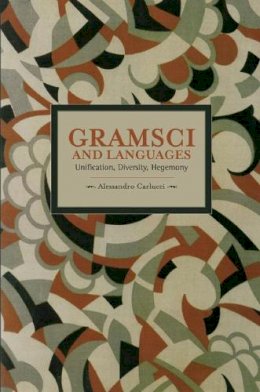
Stock image for illustration purposes only - book cover, edition or condition may vary.
Gramsci And Languages: Unification, Diversity, Hegemony: Historical Materialism, Volume 59
Alessandro Carlucci
€ 40.73
FREE Delivery in Ireland
Description for Gramsci And Languages: Unification, Diversity, Hegemony: Historical Materialism, Volume 59
Paperback. Series: Historical Materialism. Num Pages: 264 pages. BIC Classification: JPFC. Category: (G) General (US: Trade). Dimension: 230 x 153 x 19. Weight in Grams: 390.
Antonio Gramsci (1891-1937) is one of the most-translated Italian authors of all time. After WWII, his thought became influential and remained relevant for decades. Today it is generally agreed that his Marxism has highly original and personal features, as confirmed by the fact that his international influence has continued to grow since the collapse of the Soviet Union. Gramsci and Language offers an explanation of this originality and traces the origins of certain features of Gramsci's political thought by looking at his interest in language.
Antonio Gramsci (1891-1937) is one of the most-translated Italian authors of all time. After WWII, his thought became influential and remained relevant for decades. Today it is generally agreed that his Marxism has highly original and personal features, as confirmed by the fact that his international influence has continued to grow since the collapse of the Soviet Union. Gramsci and Language offers an explanation of this originality and traces the origins of certain features of Gramsci's political thought by looking at his interest in language.
Product Details
Publisher
Haymarket Books
Format
Paperback
Publication date
2015
Series
Historical Materialism
Condition
New
Weight
390g
Number of Pages
264
Place of Publication
Chicago, United States
ISBN
9781608464135
SKU
V9781608464135
Shipping Time
Usually ships in 15 to 20 working days
Ref
99-15
About Alessandro Carlucci
Alessandro Carlucci (PhD) is Lector in Italian at the University of Oxford. He has published widely on Gramsci, and is the editor of New Approaches to Gramsci: Language, Philosophy and Politics, special issue of the Journal of Romance Studies (2012).
Reviews for Gramsci And Languages: Unification, Diversity, Hegemony: Historical Materialism, Volume 59
"With this book, Carlucci makes a significant contribution to the growing international scholarship and debates on Gramsci. The originality of Gramsci and Languages lies mainly in its ability to recast three fundamental aspects of Gramsci’s political, intellectual and personal biography: the role of Sardinia, the influence of Italian and European historical linguistics on the development of Gramsci’s thought, as well ... Read more
